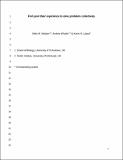Files in this item
Fish pool their experience to solve problems collectively
Item metadata
| dc.contributor.author | Webster, Mike M. | |
| dc.contributor.author | Whalen, Andrew Carl Zanton | |
| dc.contributor.author | Laland, Kevin Neville | |
| dc.date.accessioned | 2017-10-18T23:32:53Z | |
| dc.date.available | 2017-10-18T23:32:53Z | |
| dc.date.issued | 2017-04-18 | |
| dc.identifier | 249731204 | |
| dc.identifier | 9ce527cf-aaf5-410b-83ed-3e2757aa2d29 | |
| dc.identifier | 85029879794 | |
| dc.identifier | 000417173100023 | |
| dc.identifier.citation | Webster , M M , Whalen , A C Z & Laland , K N 2017 , ' Fish pool their experience to solve problems collectively ' , Nature Ecology and Evolution , vol. 1 , 0135 . https://doi.org/10.1038/s41559-017-0135 | en |
| dc.identifier.issn | 2397-334X | |
| dc.identifier.other | ORCID: /0000-0001-9597-6871/work/60427801 | |
| dc.identifier.other | ORCID: /0000-0002-2457-0900/work/60630333 | |
| dc.identifier.uri | https://hdl.handle.net/10023/11881 | |
| dc.description | This work was funded by an ERC Advanced grant to KNL (EVOCULTURE, Ref: 232823) | en |
| dc.description.abstract | Access to information is a key advantage of grouping. Although experienced animals can lead others to solve problems, less is known about whether partially informed individuals can pool experiences to overcome challenges collectively. Here we provide evidence of such ‘experience-pooling’. We presented shoals of sticklebacks (Gasterosteus aculeatus) with a two-stage foraging task requiring them to find and access hidden food. Individual fish were either inexperienced or had knowledge of just one of the stages. Shoals containing individuals trained in each of the stages pooled their expertise, allowing more fish to access the food, and to do so more rapidly, compared with other shoal compositions. Strong social effects were identified: the presence of experienced individuals increased the likelihood of untrained fish completing each stage. These findings demonstrate that animal groups can integrate individual experience to solve multi-stage problems, and have implications for our understanding of social foraging, migration and social systems. | |
| dc.format.extent | 582100 | |
| dc.language.iso | eng | |
| dc.relation.ispartof | Nature Ecology and Evolution | en |
| dc.subject | QH301 Biology | en |
| dc.subject | NDAS | en |
| dc.subject | BDC | en |
| dc.subject | R2C | en |
| dc.subject.lcc | QH301 | en |
| dc.title | Fish pool their experience to solve problems collectively | en |
| dc.type | Journal article | en |
| dc.contributor.sponsor | European Research Council | en |
| dc.contributor.institution | University of St Andrews. Centre for Biological Diversity | en |
| dc.contributor.institution | University of St Andrews. Centre for Social Learning & Cognitive Evolution | en |
| dc.contributor.institution | University of St Andrews. School of Biology | en |
| dc.contributor.institution | University of St Andrews. Scottish Oceans Institute | en |
| dc.contributor.institution | University of St Andrews. Institute of Behavioural and Neural Sciences | en |
| dc.identifier.doi | 10.1038/s41559-017-0135 | |
| dc.description.status | Peer reviewed | en |
| dc.date.embargoedUntil | 2017-10-18 | |
| dc.identifier.grantnumber | en |
This item appears in the following Collection(s)
Items in the St Andrews Research Repository are protected by copyright, with all rights reserved, unless otherwise indicated.

